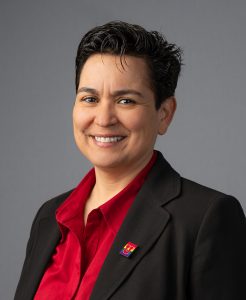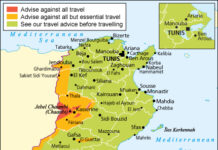
Mary Ann Villarreal, vice president for Equity, Diversity, and Inclusion
The Vice President of Equity, Diversity, & Inclusion (EDI) at the University of Utah doesn’t often talk about her military service. Mary Ann Villarreal certainly isn’t interested in hiding her service record, but she says her experience was complicated, and that her reasons for enlisting involved a number of factors—some of them deeply personal.
“I joined the Air Force in January of ’89—as both a valentine to my grandfather, [but also] to get to college.” Most people in the small rural Texas town where she grew up went to work in the nearby industrial plant or joined the armed forces. Not even twenty years old when she started basic training, she says she didn’t quite know what she was in for. At Westover ARB in Massachusetts, she worked the graveyard shift during Desert Shield/Storm, loading heavy equipment and supplies—sometimes in freezing New England storms—into the cargo hold of massive C-5 supply planes. “I was lucky to find a community there.”
Villarreal credits her NCO-ICs (Non-Commission Officers in charge) at Westover for both watching over her and showing her what it meant to lead in that environment. “I had two [NCO-ICs]…who were absolutely committed to people. They cared more about their team than the rules.” Their example left a lasting impression, and she says they taught her about “leadership, [and] what it means to care for others.”
Today’s armed forces are different in some ways than those that existed during Operation Desert Storm or after 9/11. But Villarreal notes that for many people military service remains “a way out… a matter of access to resources, to travel” and meeting other needs. Currently, there are approximately 1.3 million active duty personnel, and the Pew Research Center reports that the military is now “more racially and ethnically diverse than in previous generations …[and] the gender dynamics also have changed over the course of the past 50 years…” But despite this progress in representation and diversity, there are some challenges the military continues to face. According to the Council on Foreign Relations, “women and racial and ethnic minorities remain underrepresented in parts of the military, particularly at the highest levels of leadership.” And though repeal of the “Don’t Ask—Don’t Tell” policy has allowed gay personnel to serve openly in military ranks, “broad prohibitions on those who are transgender [remain in place].”
“Some argue that the military is the first place to grapple with these big issues,” Villarreal points out. “If the military is about community and family—it’s about responsibility [to those values], too.”
Today, the VP leads campus-wide efforts to strengthen equity and inclusion at the University of Utah—and oversees its various student resource centers. She says her experiences in the Air Force have had an impact on the way she now leads. “I am very mission-driven—the roots of that commitment started with the military.” She says, where it concerns our Veterans, the mission now is to recognize them—but also to listen to what they’re saying they need in terms of resources and support. She also notes the importance of acknowledging and embracing the complexity—even the contradictions!—in the experiences of those who’ve served.
This Veterans Day, Equity, Diversity, & Inclusion recognize and commend our veterans who have moved from active service to the new adventure of an undergraduate or graduate degree. To learn more about the University of Utah’s Veterans Support Center, visit their website or Facebook page. And to discover more about EDI at the university and their work to support veterans and other student communities on campus, visit our blog and subscribe to our newsletter.








